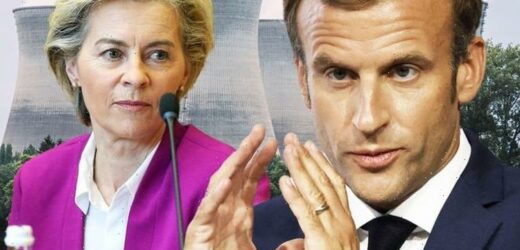Macron wields 'tools to set EU agenda'
We use your sign-up to provide content in ways you’ve consented to and to improve our understanding of you. This may include adverts from us and 3rd parties based on our understanding. You can unsubscribe at any time. More info
Electricity giant EDF on Wednesday announced that the Flamanville plant on the Channel coast would not be loaded with fuel until the “second quarter of 2023” instead of late 2022. Mr Macron has been pushing for plans for new reactors to provide low-carbon energy. This comes as France has demanded that nuclear should be classified as a “green” technology under future EU rules.
The projected costs had increased by another €300million (£250.6million) to €12.7billion (£10.6billion), EDF said.
This is about four times more than the initial forecast of €3.3billion (£2.76billion).
Construction on the new-generation EPR plant began in 2007 and was supposed to be finished in 2012.
Back in November, Mr Macron had announced that “for the first time in decades, we will restart construction of nuclear reactors in our country”.
He said that the plans would “guarantee France’s energy independence”.


This comes at a time when Europe’s energy prices have been soaring as a result of its dependence on Russian gas.
Russian President Vladimir Putin has sent prices skyrocketing to record highs by decreasing volumes of gas travelling into the continent through its network of gas pipelines.
Now, there have been calls to include gas and nuclear in the EU’s green taxonomy.
The EU’s taxonomy is intended to hand a green badge to companies and activities – or to withhold it – to “help shift investments where they are most needed”.
This is part of the bloc’s aim to direct funding towards energy sources with a low or zero carbon footprint.

With 56 reactors providing over 70 percent of France’s electricity, according to EDF, Paris has led the charge for nuclear power to be recognised as a green technology.
But these calls have sparked fury among a group of countries who say it is not a “green” energy source.
German Eevironment Minister Steffi Lemke has said it would be “absolutely wrong” to include nuclear energy on the list, as it “can lead to devastating environmental catastrophes”.
German Europe Minister Anna Luehrmann told AFP last week that will “agree to disagree on the issue” with the French on the issue.
Berlin is currently planning to shut all its nuclear plants by the end of this year.
And the new German coalition now includes the Green party, which has been strongly opposed to nuclear energy since to the 1970s.
DON’T MISS
Archaeology breakthrough: Rare armour found in ancient China [REPORT]
Brexit Betrayal: Boris on brink as Labour forces vote on scrapping VAT [INSIGHT]
China’s Moon rover determines ‘mystery hut’ identity [REVEAL]

But Germany is not alone in its disapproval of French demands.
Climate Action Network slammed Mr Macron’s plan as an act of “greenwashing”.
The group said: “The greenwashing operation being carried out by France is potentially costly.
”Billions of euros could be diverted away from investing in a just transition to a sustainable economy to finance the construction of new nuclear and fossil gas power plants, until at least 2045 and 2030 respectively.”
State-controlled EDF said Wednesday that the delays to the Flamanville plant could partly be blamed on the pandemic.
The plant has experienced a number of technical setbacks in the past, like when the nuclear watchdog identified problems with wielding back in 2019.
But the delays in France could spell bad news for Britain too.

That is because British sites, Hinkley Point C and Sizewell C, will both use the same new EPR reactor design.
Nuclear power accounts for about 20 percent of UK annual power.
But most of its ageing nuclear fleet is set to shut down within the decade.
Hinkley Point C in Somerset and Sizewell C in Suffolk are currently the only new plants on the table.
A spokesman for EDF said: “The experience gained from other EPRs has already led to innovation and productivity improvements at Hinkley Point C which is making great progress despite the challenges created by the Covid pandemic.
“These benefits will flow through to Sizewell C where replication will reduce costs for consumers. The current gas crisis underlines the value of investment in nuclear in this country.”
Source: Read Full Article


